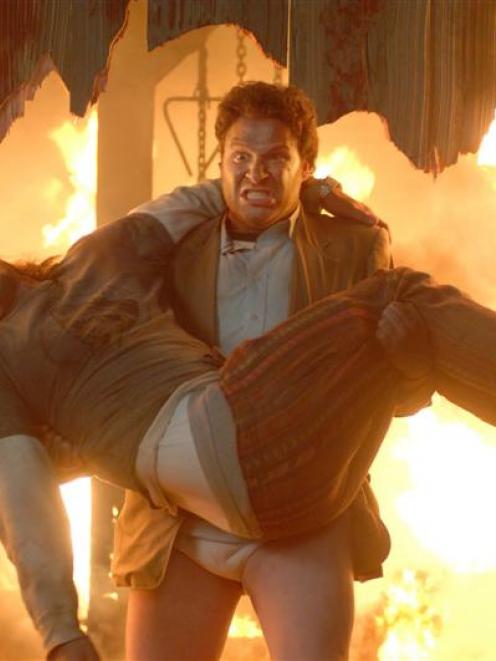
Producer: And?
Writer: And that's it. That's the plot.
Producer: Seems thin.
Writer: Right, right, I see your point. OK, what if the guys are high?
Producer: Now you're on to something.
Cheech and Chong, Harold and Kumar, Thurgood and Scarface.
For 30 years, we've been stupidly giggling over the impaired antics of schlubby guys and the ganja they love.
Now we have Pineapple Express, a stoner flick for a generation paradoxically symbolised by both BlackBerrys and Judd Apatow.
Which, in some ways, makes it not a stoner flick at all, at least not according to King Schlub Seth Rogen, who co-wrote the script with Evan Goldberg.
Rogen stars as Dale Denton, a man-child process server who witnesses a murder while smoking some Pineapple Express, aka the best pot ever.
As luck and plot necessity would have it, the killer is a drug lord who can trace a left-behind roach straight to its smoker.
So Dale and Saul (James Franco), his dealer, must make a trippy escape from the bad guys and also get to Dale's girlfriend's house for a meet-the-parents dinner.
The relationship between Saul, who sells drugs but has a kind heart, and Dale, who has the trappings of adulthood but is kind of a jerk, is what Rogen hopes audiences will focus on.
Except . . . the film kind of needs the pot to work.
Sans the weed, Pineapple Express would have been a straight-to-DVD buddy comedy, Dumb and Dumbest meets American Pie 57.
With it, portions of the movie are downright inspired, as when Dale and Saul first realise they are targets but get distracted by a case of the munchies.
Or when, captured by a hit man, they are too baked to realise their captors can hear every word of their escape plan.
The reviews roll with it, but a viewer can't help saying Dude, again?.
Because three minutes into the plot and we're already having paranoid flashbacks to stoner flicks of yore: OK, so here's when toking up gets them into a ridonkulous situation.
And here's where they're so stoned that the simplest of tasks becomes an exercise in high-larity.
And wait, yeah, now the pot is going to be some character-revealing catalyst to help the protagonist do something he wouldn't have been able to do when he's straight.
In 1998's Half-Baked, one fully baked character accidentally sends a diabetic horse to a sugary death, forcing his stoner buds, led by Dave Chappelle, to sell even more dope to make his bail.
Chappelle gets the girl in the end, one appropriately named Mary Jane.
Harold & Kumar Go to White Castle (2004) featured high-achieving sons of immigrants, whose pot-smoking leads to rabid raccoons, a randy Neil Patrick Harris and eventual liberation from parental pressure and cultural stereotypes.
The list could go on.
Most optimistically, they're all stories about finding wonder and absurdity in everyday life.
Most pessimistically, they're all cultural commentaries on how 20-something men need drugs to help them bond with one another, get in touch with their emotions and find true happiness.
Most realistically, they're films that can be made for a relatively low budget "and appeal to my 13-year-old son", a key demographic, says film historian David Thomson.
Does a weed comedy even have a place in today's Ritalin world?
Harold & Kumar made only $18 million, compared with more than $40 million - in 1978 dollars - for Up in Smoke.
Rogen and Goldberg were aware of the changing audience tastes.
"We made it an action movie," Rogen says.
"We were aware that if you're going to make a weed movie today, it can't be a movie just about smoking weed."
Pineapple Express feels less like a traditional weed movie and more like a weed movie for people on speed who need a fast-paced soundtrack and a few shootouts.
And, of course, there's the "emotional story" between Dale and Saul that Rogen insists was the inspiration for the film.
At least initially.
It was going to be all head-butts and "bro-mance", and then Rogen saw the cover of a recent Rolling Stone, which labels Pineapple Express as the "greatest stoner movie ever".
Then he began to embrace the stereotype.
"As much as we didn't want to make it a weed movie, when I saw that cover I was like, whoa, that's [expletive] amazing. If you're going to do it, do it right."
- Monica Hesse












